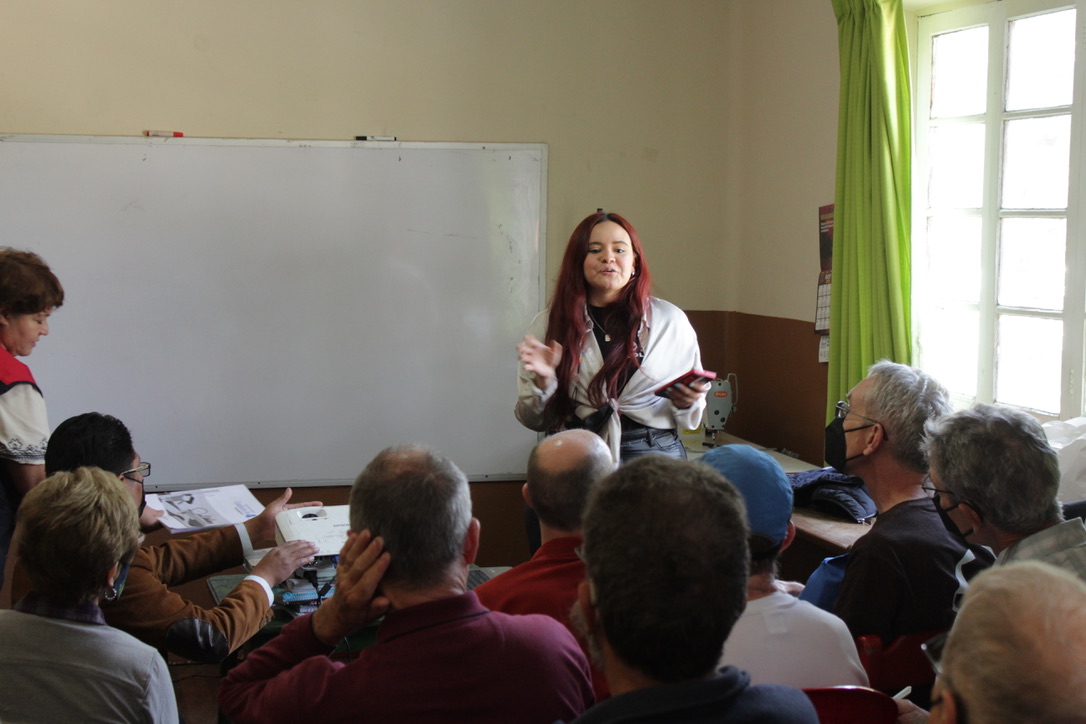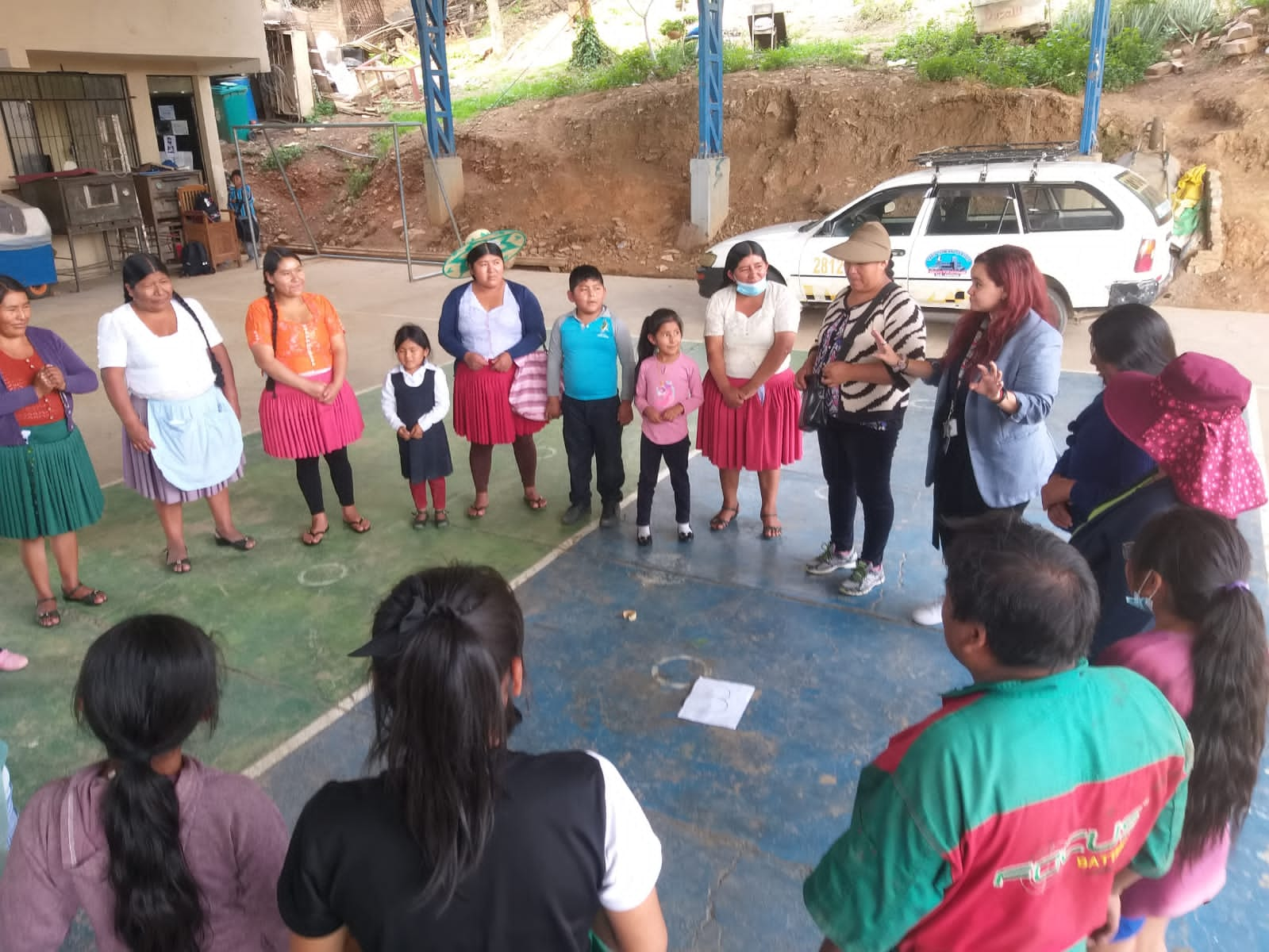“When we love, everything blooms”
An inside look at the love-filled work of a Seeder in Bolivia

Earlier this year, MCC staff Rachel Watson connected with Andrea Castro, a participant in MCC’s Seed program in Bolivia to learn more about what it’s like to be part of the program. Seed is an MCC service program where young adults work and live in a community for a two-year term while growing and learning together as a cohort. Andrea is working at OBADES (Baptist Organization of Social Development), an organization that helps farmers adapt to changing climate and provides care to vulnerable youth and children. Their conversation has been edited for clarity.
One of the things I remember most from my conversation with Andrea Castro was a quote from her grandmother: “My grandmother always tells me, ‘Con amor, todo florese,’ which roughly translates from Spanish to ‘When we love, everything blooms.’”
It seems so simple when she says it like that. If only love was like a switch that, if turned on, caused the lives of those around us to flourish like bright red roses.
To see anything flourish requires consistent dedication, intentionality and willingness to adapt to your surroundings. Castro’s work at OBADES is demanding. She works with children who have a parent in prison and mothers who work hard to provide a better life for their children. But her work is successful because of her ability to empathize, think critically and communicate assertively. She’s able to see children on their individual journeys and to meet them where they’re at.
I wanted to know more about how Andrea does this well, so I sat down with her to talk more about her work and her connection with MCC Bolivia’s Seed program.
Rachel: Can you describe a bit of your work and some of your daily activities at OBADES?
Andrea: My daily work is an adventure, it’s always different. Most days will start with a check-in with our team. As a psychologist, I’m attentive to the team's observations about the children’s behavior in the classroom. I follow up and address it in the psychological workshops.
My style is to have group sessions with children and adolescents first. We work on things like emotional management, trauma awareness, etc. It’s a safe space for sharing their opinions. Many times, it’s a way to connect with kids and work on a specific concern in a personalized way. They come to me more easily and say, “Something happened to me, I'm struggling with this, can you listen to me?”
I’m trying to be flexible and to follow my goals but it’s impossible to avoid being pulled off that track sometimes. It’s part of the work to be flexible and to be ready for whatever they need.

R: Do you have an example of someone who’s changed after you’ve worked with them?
A: I was working with a teenage girl who was struggling with low self-esteem with her body. Her family and friends told her, “You need to lose weight, you’re ugly.” They told her that God wanted her to be sick as a punishment. We’ve been working together on self-love, about how God doesn’t want her to have any illness.
We had to fight against the ideas that other people wanted her to believe. The thing that works with teenagers is not to tell them what to do. It’s to provide information and to let them question the theory.
I was helping her to question and confront these ideas. I was asking her, “Do your legs not work? Are they helping to move you and walk? Could we appreciate that?”
I asked her to write down the things she liked about herself when she looked in a mirror. At first, she was like, “It was hard, I couldn’t do it.” And I’d say, “It’s OK, you don’t have to rush it. Let’s try it again when you’re ready.” I was so proud when one day she came to my office and said, “I could finally say things about myself that I like! My legs help me to walk, my hair is covering my head, I love my eyes, I can see people! Look at my arms!”
She’s a leader now; she has confidence in herself that’s different. She was so ashamed of herself before and would hide in her clothes. Now she’s dressing with style, and I love seeing that. I know it’s not a line where you’re always confident, it changes all the time. But she’s working on it and I’m very proud of her.
R: What sort of strategies do you use with other age groups?
A: When a child comes up to me with a project they’ve been working on, I don’t tell them “Oh, your work is so beautiful!” I like to ask them, “What do you think about that?” They need to create an idea about what they’re doing because if you’re the one giving them approval and affirmation, they’ll grow up seeking the approval of other people. It’s better when they create their own ideas. They might respond, “Oh, I don’t like this!” And I’d say, “Well, let’s do it again!”
I know it’s a different style, but I think they like being treated like little humans. I want to empower them that they are human beings and can think for themselves, not just what their parents think.
R: What have you been learning in your work lately?
A: I’m learning how to work with people in so many different contexts and ages. At first, it felt like I needed to be professional and formal with the adults when they came in for workshops. But I was struggling — it didn’t feel natural, jumping from being with kids to being formal with the adults. Then one day I said, “We’re going to try an activity now” and it was one I did with the kids earlier, where we were working on things that we wanted to stop, pause or start in our life. The adults were pretending to be cars. It was so fun for them; it was like a release.
So, what’s the idea of this activity? We need to think before we talk. We have emotions, but let’s stop, let’s reflect, like a yellow light. Then let’s go and move on. We talked about this in terms of parenting; it's OK to feel angry or scared, you don’t know what to say. Let’s pause and think about it a little first.
They like to feel like a kid, to laugh and have fun. And to their surprise, I’ll say, “I did this this morning with your kid.” It’s a point of connection for the parents and the kids at the dinner table.
R: How has being part of the Seed program helped you in this work?
A: The Seed program is my family. It’s helped me to feel love, support and connection. We feel what each other is feeling. We fill each other with good ideas too; like, “OK that’s not working, how about trying to do this other thing instead?” Because we don’t have other people to talk about those things with, nobody else really understands the reality. And we laugh — laughter is a therapy and so we laugh and have fun because we’re doing this adventure together.
R: Any advice to someone considering Seed?
A: They should do it. They get the gift of two years to live with themselves and to get to know themselves better without distractions. When you’re in a new country, you’re out of your comfort zone. When you leave your responsibilities and families, you suddenly have the time to think about yourself in a new way. I can listen to my body and my emotions; I’ve learned to accept them.
It’s important to leave your comfort zone. Because you’ll be able to appreciate and feel connected to other parts of the world. Bolivia is a different country and context, sometimes you understand what’s happening, and you feel Bolivia like it’s your own. Other times it feels different. But it’s important to walk through all those changes.
***

